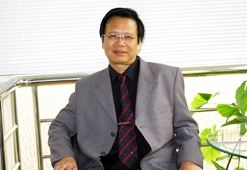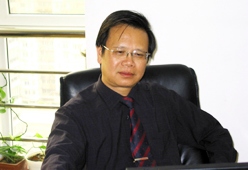网络游戏玩家为虚拟财产失窃上诉
爱丽丝
嫣
由于李宏晨的起诉,对虚拟财产的法律保护问题已经成为大陆几百万网络游戏玩家关心的话题。
23岁的李宏晨将国际互联网络游戏经营商北极冰科技公司告到北京朝阳法院,控告该公司侵犯他的私人资产。这是大陆首例此类案件的诉讼案。
去年二月,李先生在玩“红月”游戏时发现,他所积累的所有武器装备被另一个玩家偷窃。他说损失了这些他特别喜爱的武器装备包括“头盔”、“战甲”和二盒抑制剂,使他特别懊恼。因为在游戏比赛的虚拟世界中这些“物品”具有难以估量的价值。
李先生说,为了获得这些武器装备,两年多的时间里他花费了数千小时以及10,000多元(9,400多港元)。
北极冰科技公司说这些武器装备只不过是一些数据资料。法院对此案进行了二次开庭审理,并将在下月判决。
 朱寿全——北京长济律师事务所主任律师说,互联网的虚拟财产与我们现行法律意义上的财产的涵义不同,现行法律意义上的财产纠纷主要涉及货币、资金或固定资产方面的纠纷。
朱寿全——北京长济律师事务所主任律师说,互联网的虚拟财产与我们现行法律意义上的财产的涵义不同,现行法律意义上的财产纠纷主要涉及货币、资金或固定资产方面的纠纷。
“但是既然游戏玩家为获得虚拟财产投入了大量的时间和金钱,因此对这些国际互联网络上的东西,他们应该有法定的权利。”
虚拟财产成为法律的盲区。“如果游戏公司在他们的服务合同中作出了保证,则根据此合约,案件是可以审理”,朱律师说。
(本文发表在《华南早报》上,20031124,以下是英文原文)
Online
Game Player Sues for Loss of Virtual Assets
Alice Yan
The legal protection of virtual assets has become an issue for millions of mainland
online game players thanks to a lawsuit filed by Li Hongcheng.
The 23-year-old
is suing internet game provider Arctic Ice Technology in Chaoyang Court, Beijing,
claiming the company infringed on his private assets. It is the first lawsuit
of its kind to be files on the mainland.
In February last year, Mr. Li discovered
that all the weapons he had amassed while playing the game Red Moon had been stolen
by another player, He said the loss of favourite weapons, including helmets, a
war gown and two boxes of poison left him depressed, since they had incredible
value in the game's virtual world.
Mr. Li said his weapons had cost him
thousands of hours and more than 10,000 yuan (HK$9,400) to acquire over two years.
Arctic Ice said the weapons were nothing more than data. The court case has
already gone through two hearings and results should be announced next month.
Zhu Shouquan, attorney and director of the Beijing Lixing Law Firm, said: "Web-based
virtual assets are quite different from what our laws cover - the mainly refer
to disputes over money, capital or fixes assets.
"But since gamers
invest a lot of time and money in [acquiring virtual property], they should have
legal rights over these things on the internet."
Virtual assets fall
in legal grey area. "If game companies wrote guarantees in their service
contracts, cases could be tried based on the agreement, said Mr. Zhu.
以下是《华南早报》记者就“手机音乐铃声”采访北京长济律师事务所主任律师朱寿全的文章:
流行歌曲作为手机铃声的版权诉讼接受调解
珍
蔡
中国最大的音乐版权纠纷—— 一场关于流行歌曲作为手机铃声的争端——的对手已同意接受调解。中国音乐版权协会,这个中国大陆最大的音乐界的版权机构,和中国大陆的移动电话一流制造商TCL移动通信公司,已经同意接受调解,而不是继续进行法庭诉讼。此案是上星期五起在北京开庭审理的。
但是双方对所支付的补偿费远未达成协议以期解决争端,"北京时报"报道说。
基地在广东的TCL公司已经承认,它侵犯了中国音乐版权协会20个作曲家会员的版权,因为它未经许可或支付使用费而将他们的音乐作品当做移动电话铃声。但是该公司强调它的赔偿不能超过500,000元(467,000港元)。
代表音乐家的中国音乐版权协会在去年十一月最初提出的诉讼请求是要求赔偿128,400,000元。这个数字是按照TCL公司在2002年售出的6百万部电话中所使用的乐曲每部0.12元然后加倍计算的。
TCL公司向法院提交了中国通信行业协会的一封信。信中说由于从这些已销售的移动式电话中所获得的利润极微,期望每部电话为所用的乐曲支付0.12元是不现实的。但是中国音乐版权协会坚持说,其他移动电话经营商使用其会员拥有版权的乐曲时就是按照这个价格支付的。
 在达成接受调解协议之前,TCL公司星期五在法庭声申辩说这个索赔金额不合理,因为每部支付0.12元费用太高。
在达成接受调解协议之前,TCL公司星期五在法庭声申辩说这个索赔金额不合理,因为每部支付0.12元费用太高。
法律专家说最初的高额索赔表明该协会对推动版权保护增加了信心。
“同几年前相比,中国音乐版权协会在遇到保护它的会员的版权时更有准备和更有勇气。”一位从事知识产权方面的律师朱寿全说。他说增加公众的意识和支持保护版权的问题将是此案审理过程中考虑的一个因素。
他补充道,就此案来说,国家还没有法规规定侵权一方应支付或赔偿多少。
(本文发表在《华南早报》上,20031020,以下是英文原文)
Mediators to Settle Copyright Issue of Pop Songs as Ring Tones
Jane
Cai
Opponents in China's largest music copyright dispute - a battle over
the use of pop tunes as mobile phone ring tones - have agreed to accept mediation.
The Music copyright Society of China (MCSC), the mainland's largest copyright
agency for the music industry, and TCL Mobile Communication, a leading mainland
mobile phone manufacturer, have agreed to accept mediation rather than proceed
with their court case, which began in Beijing on Friday.
But the two sides
were still far from reaching agreement on the compensation that should be paid
to settle the dispute, the Beijing Times reported.
Guangdong-based TCL has
admitted it breached the copyright of 20 composers, all members of the association,
by using their music as ring tones for its mobile phones without receiving permission
or paying royalties. But the company insists it cannot pay compensation exceeding
500,000 yuan (HK$467,000).
MCSC, representing the musicians, claimed compensation
of 12.84 million yuan when it filed the original lawsuit last November. The figure
was calculated on a payment of 0.12 yuan for each piece of music used on all of
the 6 million phones sold by the company in 2002 and then doubled.
Before
the agreement to accept mediation was reached, TCL argued in court on Friday that
the compensation claim was unreasonable because the payment of 0.12 yuan was too
high.
TCL presented a letter to the court from the China Communication Industry
Association which said that as the profit earned from the sale of each mobile
phone was minimal, it was not realistic to expect 0.12 yuan for each piece of
music used, but MCSC insists this is the price paid by other mobile operators
using copyright held by its members.
Legal experts say the high figure of
the initial claim indicates the association's increasing confidence in pushing
copyright protection.
"Compared with a couple of years ago, MCSC is
much better prepared and more daring when it comes to protecting the copyright
of its members, "said Zhu Shouquan, a lawyer working in the area of intellectual
property rights.
He said increasing public awareness and support for copyright
issues was a factor in allowing the case to go forward.
He added there
were no "national rules" on how much each side should pay and compensation
depended on the case.
第1页 第2页 第3页
第4页 第5页



